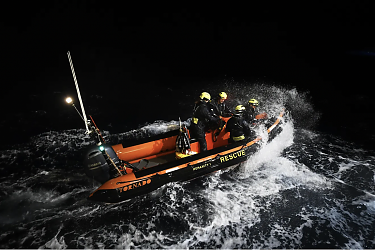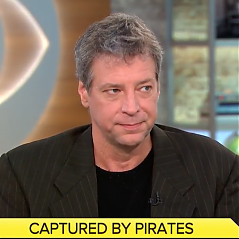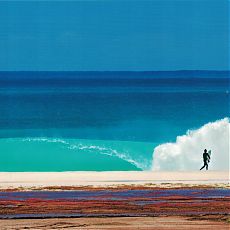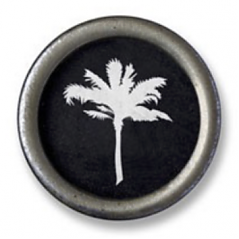How Do You Prosecute a Pirate?
Like dogs chasing cars, Western powers cruising for Somali pirates are a little stumped about what to do when they’re captured.
November 2009
The most eyebrow-raising aspect of Western counter-piracy missions off Somalia is how rarely they arrest a pirate. Last September I spent a few days on a Turkish frigate called the Gediz, one of NATO’s busier ships in the Gulf of Aden, and the captain admitted that even when they catch pirates, they almost never make an arrest.
“NATO doesn’t arrest for piracy,” Capt. Hasan Özyurt told me, “but nations do. It depends on the situation, and it’s case by case. … Each nation has some policy for detention.”
So what happens when NATO stops a pirate boat? “At a minimum,” said NATO Commodore Steve Chick, speaking for the whole alliance, “we will always take measures to ensure that their weapons are destroyed, so as to deny their future use.”
But that’s it. The sailors tend to dump the weapons overboard and deposit the pirates back on a Somali beach.
Last week a group of legal experts gathered for talks in the Netherlands and failed to come up with a single, smart way to navigate the international problems with prosecuting pirates. They wondered if the Hague-based International Criminal Court would expand its remit to pirate cases, and the consensus answer was “no.”
“The ICC does not have an international police or task force to enforce the ICC statute,” said Geert-Jan Knoops, a Utrecht University professor of international criminal law.
This means that no single force, operating under a single set of rules, exists to gather evidence on arrested pirates and bring them to trial in The Hague or any other international court. A single force or a single set of rules would be useful, because one complication with prosecuting pirates is the number of national interests involved.
What if, for example, a Dutch warship chases Somali pirates attacking a Greek-owned vessel, and even catches the mother ship, which happens to be a hijacked Yemeni fishing dhow loaded with plenty of weapons and 20 kidnapped fishermen?
Answer: The Dutch would let the pirates go.
It really happened in April. Dutch law says the Dutch navy can arrest a pirate if he’s in Dutch waters, harms a Dutch citizen or happens to be Dutch himself. Otherwise, the pirate goes free.
Most European nations, including maritime giants like Germany and Denmark, have similar policies. American policy gives the U.S. Navy more leeway, but its principles are largely the same. Fifth Fleet spokesman Lt. Matt Allen told me the Navy doesn’t arrest people on the high seas at all — “Arrest is a law enforcement term,” he said — but the Navy has detained a handful of suspected pirates this year for prosecution in Kenya.
“Each event is reviewed for its evidentiary value,” based on “guidelines provided by the Kenyan government,” he said.
Only one suspect — Abduwali Abdukhadir Muse — has gone to the United States for trial. Muse was arrested by the FBI for his role in kidnapping an American citizen, Richard Phillips, captain of the Maersk Alabama.
Normal protocol in these situations is to let the home nation try its own criminals. But Somalia has no central government, no coherent piracy laws, and it hasn’t signed up to the U.N. Convention of the Law of the Sea. To get around this problem the U.S. as well as the EU have signed “memoranda of understanding” with Kenya to let their navies bring captured pirates to Mombasa, the nearest stable African port.
But it’s a stop-gap measure. Right now at least a hundred suspected pirates are awaiting trial in a dirty Mombasa jail, and it’s not clear they will receive anything like a fair trial.
One reason for the understanding with Kenya is to avoid embarrassing requests for asylum once the pirates have been tried in wealthier nations like the Netherlands or the United States. One Somali pirate convicted in the Netherlands told his lawyer last May that his Dutch prison cell was comfortable; he wanted to bring his family over when his prison term was up. Abduwali Abdukhadir Muse looked exuberant when he first arrived in Manhattan last April — until he was told his visit to America would involve an awful lot of prison time.
The ongoing lack of an international pirate court, combined with the unwillingness of most Western governments to prosecute, should ensure that a few hundred determined Somalis will keep trying to hijack ships. Even U.S. Secretary of State Hillary Clinton, after a talk with her Dutch counterpart in April, admitted that releasing pirates “sends the wrong signal.” But nothing, since then, has changed.
Michael Scott Moore

Rafts of the Medusa
Why every day on the Mediterranean is a new scandal for Europe. For both Foreign Policy and Die Zeit.
California’s Attempt at Land Reparations
How land seized from a Black family 100 years ago may be returned. The Bruce’s Beach story from a hometown angle, for The New Yorker
Day of the Oprichnik, 16 Years Later
The novelist Sorokin, the president Putin, his man Dugin, and the war in Ukraine. For n + 1.

The Rushdie Narrative
Knife and the crumbling ground beneath free speech
There Must Be Some Way Out of Here
An essay on Bob Dylan, “All Along the Watchtower,” and Somali pirate captivity.
That Mystic Shit
The life of Lou Reed in two biographies

Cambodian Seafarers Talk About Pirates
Mike visits Cambodia for The New Yorker to talk about a harrowing shared experience in Somalia
The Muslim Burial
Cambodian hostages remember digging a grave for one of their own. A sequel chapter to The Desert and the Sea
The Real Pirates of the Caribbean
Adventure journalism in Southern California. A travel essay for The Paris Review.

Antifa Dust
An essay on anti-fascism in Europe and the U.S., for the Los Angeles Review of Books
Was Hitler a Man of the Left?
A book that helped Republicans in America lose their damn minds.
Ghosts of Dresden
The Allied firebombing of Dresden in 1945 destroyed the baroque center of what Pfc. Kurt Vonnegut called, in a letter home from Germany, “possibly the world’s most beautiful city.”

George Freeth, Biographed
The first academic treatment of America’s surf pioneer. Also, was Freeth gay?
It’s Called Soccer
Americans live on what amounts to an enormous island, defended on two shores by the sea, and we’ve evolved a few marsupial traditions that nobody else understands.
Tilting at Turbines (in the Severn River)
The morning was clear and cold, with frost on the church steeple and the cemetery grass. I had a quick English breakfast at a white-cloth table, in my wetsuit, and drove to Newnham, a village on the Severn River in Gloucestershire, parking near the White Hart Inn.

The Curse of El Rojo
I’d packed the car lightly — a bag of clothes, a bag of cassette tapes, a backpack of books, a few essential tools.

































